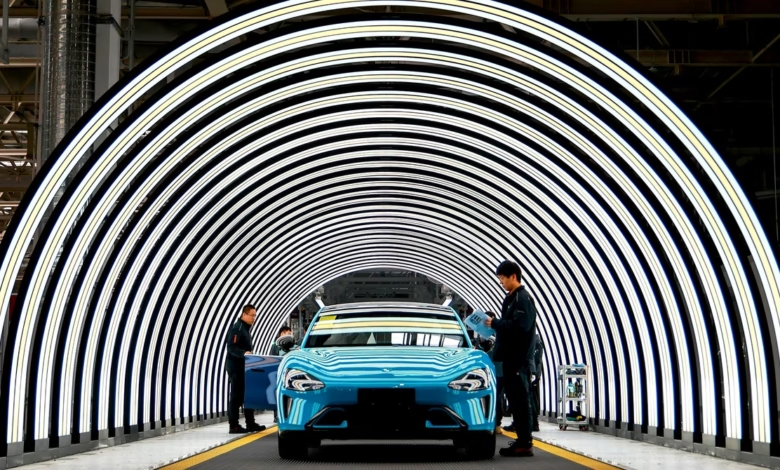China’s EV Factories Now a Must-See Tourist Attraction

▼ Summary
– Electric vehicle factory tours in Beijing, like those offered by Xiaomi, have surged in popularity, with tens of thousands applying monthly for limited lottery-based spots.
– Chinese EV brands, including Xiaomi and Nio, are using factory tours to showcase premium features and automation, with more automakers planning similar initiatives.
– Xiaomi’s factory boasts a 91% automation rate, impressing visitors with robotic arms handling most tasks, as described by a recent tour participant.
– The trend reflects a shift in Chinese EV marketing, with tours serving as a communication tool to highlight both technology and brand identity.
– While factory tours aren’t new in China, EV brands have turned them into mainstream attractions, drawing non-buyers fascinated by industrial robotics and brand charisma, like Xiaomi’s founder Lei Jun.
China’s electric vehicle factories have transformed into unexpected tourist hotspots, drawing massive crowds eager to witness cutting-edge automotive manufacturing firsthand. What began as niche industrial visits has exploded into a cultural phenomenon, with brands like Xiaomi and Nio reporting tens of thousands of monthly applications for limited tour slots. These experiences blend factory floor access with hands-on EV test drives, creating a new form of tech-driven entertainment.
The shift reflects how Chinese automakers are evolving their brand strategies. No longer content with competing solely on price, companies now showcase premium craftsmanship and technological prowess through immersive public experiences. Xiaomi’s Beijing facility, for instance, boasts 91% automation, a statistic that comes alive as visitors watch robotic arms perform precision assembly with minimal human intervention. “It felt like stepping into the future,” remarked one parent who recently toured the plant with their teenager.
Industry analysts note these tours serve multiple purposes beyond marketing. They demystify EV production while fostering emotional connections between brands and consumers. Freya Zhang, an automotive market specialist, observes that visitors leave not just impressed by machinery, but by the human stories behind these technological marvels. The approach mirrors successful factory tourism models pioneered by Western brands like Coca-Cola, but with distinctly Chinese characteristics, including intense digital competition for limited spots through lottery systems.
The phenomenon taps into broader societal trends. For many participants, these visits represent more than car shopping, they’re aspirational experiences blending education and entertainment. Some attendees, like Beijing resident Zhao Mingfei, are drawn by celebrity CEOs as much as the vehicles themselves. After months of trying, Zhao secured one of just 60 spots among 7,000 applicants, motivated by admiration for Xiaomi’s founder Lei Jun. Others simply enjoy witnessing industrial automation as a weekend activity, with factory floors becoming unlikely stages for robotic performances.
As three additional automakers prepare to launch similar programs, the trend shows no signs of slowing. These transparent manufacturing showcases represent a strategic pivot, transforming factories from production hubs into brand ambassadors that educate, inspire, and ultimately convert casual visitors into loyal advocates. Whether attendees leave as customers or just curious observers, they invariably depart with a tangible sense of China’s automotive innovation.
(Source: WIRED)